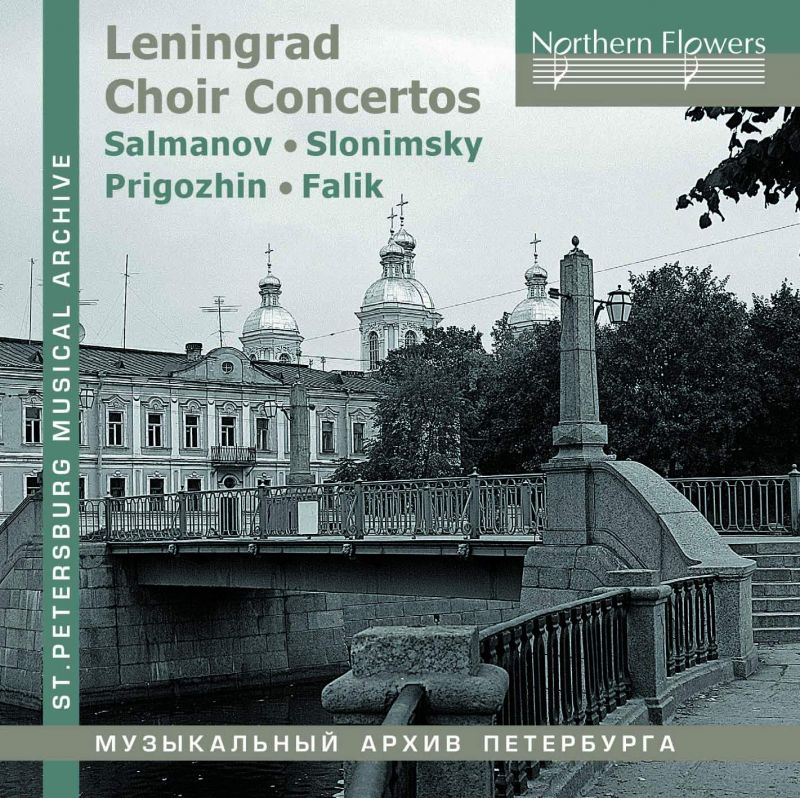Leningrad Choir Concertos
View record and artist detailsRecord and Artist Details
Composer or Director: Yuri Falik, Lucian Abramovich Prigozhin, Sergey Mikhaylovich Slonimsky, Vadim Nikolayevich Salmanov
Genre:
Vocal
Label: Northern Flowers
Magazine Review Date: 11/2019
Media Format: CD or Download
Media Runtime: 63
Mastering:
DDD
Catalogue Number: NFPMA99134

Tracks:
| Composition | Artist Credit |
|---|---|
| Swan Maiden, Concerto for Choir to Words |
Vadim Nikolayevich Salmanov, Composer
Grigory Sandler, Conductor Leningrad Radio and TV Chorus Vadim Nikolayevich Salmanov, Composer |
| And Quiet Floes the Don |
Sergey Mikhaylovich Slonimsky, Composer
Leningrad State Capella Choir Sergey Mikhaylovich Slonimsky, Composer Vladislav Chernushenko, Conductor |
| Symphony in Rituals for Choir a Capella and Oboe |
Lucian Abramovich Prigozhin, Composer
Khanyafi Chinakaev, Oboe Lucian Abramovich Prigozhin, Composer Valentina Kopylova, Conductor vocal ensemble |
| Poesas of Igor Severyanin |
Yuri Falik, Composer
Leningrad State Capella Choir Vladislav Chernushenko, Conductor Yuri Falik, Composer |
Author: Richard Whitehouse
Within this context, Vadim Salmanov’s Swan Maiden (1967) was an undoubted breakthrough by deriving inspiration not from sacred music but from Russian folk sources – though no traditional tunes appear over its five movements. Division between solo and ensemble groups is abetted by recourse to recited and shouted passages, in what was evidently a provocative move at this time. A decade on, the other pieces adopt a more nuanced approach to their cultural ‘present’.
Inspired by Mikhail Sholokhov’s novel, Sergey Slonimsky’s And Quiet Flows the Don (1977) draws on old Cossack songs for a text whose setting utilises modality and solo singing in its incisive reappraisal of tradition. Lucian Prigozhin’s Symphony in Rituals (1978) is both more formally methodical and evocatively expressive in alternating between songs and interludes (denoted by plaintive oboe soliloquys) that suggest archaic practices played out in inherently abstract terms. Yuri Falik’s Poesas of Igor Severyanin (1979) deploys texts by the early 20th-century poet in a suite whose titles indicate the musical archetype specific to each movement.
Performances unfailingly convey the eloquence and vitality of this music, in another valuable restoration from that seemingly endless resource which is the St Petersburg Musical Archive.
Discover the world's largest classical music catalogue with Presto Music.

Gramophone Digital Club
- Digital Edition
- Digital Archive
- Reviews Database
- Full website access
From £8.75 / month
Subscribe
Gramophone Full Club
- Print Edition
- Digital Edition
- Digital Archive
- Reviews Database
- Full website access
From £11.00 / month
Subscribe
If you are a library, university or other organisation that would be interested in an institutional subscription to Gramophone please click here for further information.




